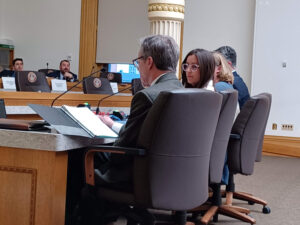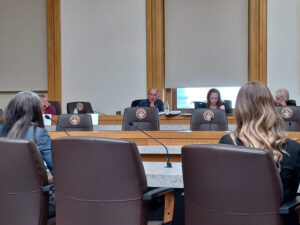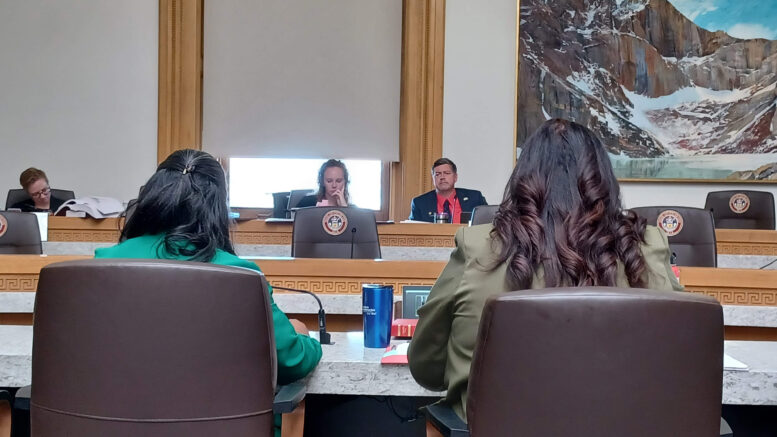Sponsors bumped significant portions of a bill that sought to ramp up air-quality permitting requirements down to a study on Thursday, though provisions that would require state agencies to investigate a wide range of pollution-related complaints remained significantly troubling enough that even two agencies in Gov. Jared Polis’ administration opposed the effort.
Still, the House Energy and Environment Committee voted along Democratic-led party lines to advance the bill to the full House after a six-hour hearing, setting up a potential showdown with the Democratic governor in the waning weeks of the 2023 legislative session. The bill also drew condemnation from business and oil-and-gas groups that complained that both the continuing legal requirements of House Bill 1294 and the potential regulations that could come from the study committee would serve as a back-door method of shutting down a key state industry.
HB 1294, sponsored by Democratic Reps. Jennifer Bacon of Denver and Jenny Willford of Northglenn, sprang from frustration with long-standing air pollution along the Front Range, particularly in the low-income communities surrounding Interstate 70 that Bacon represents. The upper Front Range, which experienced 73 days of ozone alerts in 2021 and 46 in 2022 that forced people with respiratory ailments inside often, received a downgrade last year from the U.S. Environmental Protection Agency to being in “severe” nonattainment of ozone regulations.
Significant changes
As introduced, HB 1294 would have taken huge steps, requiring extensive modeling of potential ozone increases from proposed sites that would emit what are considered minor sources of pollution, including individual oil wells and businesses like dry cleaners and breweries. It also would have required state regulators to consider the cumulative impacts of any project in a two-mile radius of a similarly owned pollution-emitting project, meaning that regulators would have to consider the totality of multiple drilling sites rather than evaluate each one individually.
But as the sponsors were working to finalize the bill, Polis announced a directive to state agencies in mid-March to require oil and gas producers to reduce 50% by 2030 their emittance of nitrogen oxides, which react with volatile organic compounds to create ground-level ozone. Bacon acknowledged in Thursday’s hearing that the groups that had helped her to create what would be HB 1294 were blindsided by the announcement and wanted to continue forward with the bill, despite Polis speaking out against the idea as going too far.
In acknowledgment of that pushback, the sponsors dropped much of the proposed permitting regulations from the bill in an amendment Thursday and substituted creation of a 12-member interim legislative committee to develop policies to improve ozone air quality in Colorado. While several backers asked the committee to pass the “most stringent version of House Bill 1294 possible,” most accepted the interim committee as a means to keep the conversation going.
What remains in HB 1294
But the bill, in its new form, also requires state agencies to adopt rules by 2025 that require electrification of all stationary engines at oil-and-gas operations sites unless operators can demonstrate that such electrification is infeasible.
It also would require the state to develop an implementation plan by June 2024 that includes the “most stringent” standards available for off-road compression-ignition engines and a requirement to use electric drill rigs and electric hydraulic fracturing engines unless the severe nonattainment status is downgraded to a maintenance area. While operators said those requirements remain rigid and difficult to achieve, they no longer include previously proposed rules that would have demanded development of vehicle-miles-traveled limits for employers.
In addition, the bill still requires the Colorado Air Pollution Control Division to begin investigating any complaints from residents on potential air-quality violations within 30 days and issue decisions within 90 days. And it allows complainants to appeal those decisions to the Colorado Air Quality Control Commission if they do not like the outcome of the investigations or to be able file lawsuits on their own to remedy the alleged violations.

Colorado Chamber of Commerce board chairman John Jacus testifies against HB 1294 in a committee Thursday as Colorado Competitive Council Executive Director Rachel Back looks on.
It was those provisions that exasperated both energy and business groups, which warned that the constant need to investigate complaints would suck up all the time of the division staff and leave it unable to resolve an existing backlog of construction-permit applications.
“It will bury the Air Pollution Control Division in complaint investigations and expose it to liability,” said John Jacus, a clean-air expert and partner at Davis Graham & Stubbs who is the board chairman for the Colorado Chamber of Commerce. “The bill is deeply flawed and incapable of reclamation in the limited time left in this session.”
Polis administration opposes bill
That section also led Trisha Oeth, director of environmental health and protection for the Colorado Department of Public Health and Environment, to oppose the bill on the agency’s behalf, saying that the prescriptive details in the proposal are fundamentally unworkable and would tie up the staff in investigations that would detract from much of its other work. Julie Murphy, Colorado Oil and Gas Conservation Commission director, offered similar reasons for her agency to oppose HB 1294, adding that the bill’s proposed definition of “cumulative impacts” cuts off ongoing work the state is doing with stakeholders to reach a consensus definition.
“Pushing to implement the deadlines in HB 1294 would derail the efforts we are making,” Oeth added, estimating the bill could cost her agency $31.7 million to implement — nearly three times the estimate figured by the nonpartisan Legislative Council.

Colorado state Rep. Mike Weissman questions Trisha Oeth, CDPHE director of environmental health and protection (left) during a committee hearing Thursday.
But several environmental groups said the current complaint process, in which CDPHE investigators must record conditions described in noise, smell or emissions complaints themselves rather than taking the data or word of community members, is broken. Former state Sen. Mike Foote, speaking as an attorney for the group Earthworks, said it once took the agency seven months to install a sound monitor to discover the validity of noise complaints made by a resident who lived near a drilling rig.
Air-quality permitting reach
“It’s a dehumanizing process, and it makes it feel like the people who complain don’t matter,” said Andrew Forkes-Gudmundson, Earthworks senior manager for state legislative and regulatory affairs.
Dan Haley, president/CEO of the Colorado Oil & Gas Association, said that while the bill may affect a host of industries, it seemed to target the roughly 350,000-worker oil and gas industry, as it would “grind air-quality permits to a halt.” Bacon said the bill is “not about putting oil and gas out of business,” though Willford said that it lays out rules for the sector because 45% of nitrous oxides and 41% of volatile organic compounds come from that industry.
HB 1294 heads next to the House Appropriations Committee and, if it receives approval, to the House floor, where passage may be all but assured with 28 of the 46 Democrats in the chamber signed on to sponsor or cosponsor it — just five less than the number needed to pass the bill. But business groups and Republicans plan to continue to fight the measure as one that, even in its watered-down form, could be costly and disruptive to state pollution-reduction efforts.
“Our communities are asking for big action. We are committed to that action,” Willford said. “That’s why we’ve listened to a lot of feedback and have set aside some of these goals for interim discussion.”
